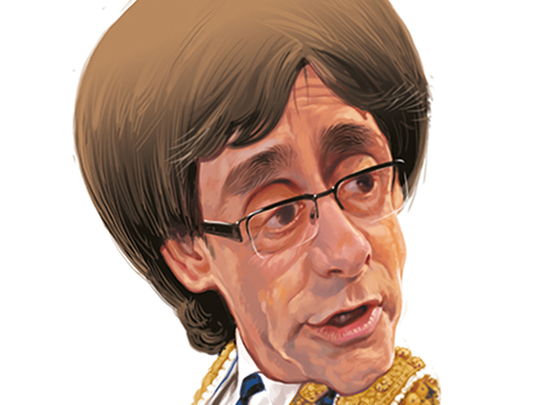
Carles Puigdemont has been the leader of the Catalan regional parliament for less than two years, but he has brought Spain to the brink of its biggest political crisis since the end of the dictatorship of General Francisco Franco four decades ago — not a small achievement for a man who fell into his role without even trying.
And despite leading the Catalonia regional assembly sitting in Barcelona since January 2016, he still makes the daily round trip of 200 kilometres from his home city of Girona. He was the mayor of that city from 2011 through to taking up his new office in Barcelona, and was single-handedly responsible for having its name changed from the Spanish ‘Gerona’ to the Catalan of ‘Girona’.
But name changes are the least of his worries now. Through his energy, he pushed for the October 1 referendum on Catalan independence, which won 90 per cent support of the 2.26 million votes cast in what the Madrid government of Prime Minister Mariano Rajoy and Spain’s Constitution Court — along with the High Court in Catalonia itself — declared illegal.
“It happened at the last minute,” Puigdemont said in an interview last month on France24 television. “It was accidental. Through a back door.”
Through accident or otherwise, Puigdemont’s full endorsement of the October 1 referendum resulted in a showdown with Rajoy, who ordered 4,000 Guardia Civil — Spain’s national police force — to the region under orders to stop the illegal vote from taking place. Before the vote, they arrested 14 election officials and seized millions of ballot papers. The Madrid government too warned anyone who might be tempted to assist the voting process that they faced possible prosecution for sedition and faced fines of €300,000 (Dh1.3 million). And before the vote, the government seized control of websites and stopped the internet services of separatist organisations and entities.
During polling itself, the Guardia Civil used batons and physical force to remove voters from polling places, firing tear gas and using other heavy-handed policing techniques, leaving more than 900 Catalans and 33 officers injured.
Since then, Puigdemont has weighed his options, finally telling Catalonia, Spain and the rest of Europe that he would suspend the declaration of independence in return for negotiations with Rajoy’s government on the region’s place in the nation.
The 54-year old who studied Philology — the origin of languages in historical documents — was largely unknown to most Catalonians before being hand-picked by Mas to succeed him, anticipating the ban from public office. That Beatles haircut is word on purpose, covering up a badly scarred head received in a life-changing car accident in 1983. That’s when he took up journalism.
For those who know him well, he’s simply “Pugi” — from a long line of village bakers from the town of Amer (population 2,000) who were long committed to the separatist cause. He started out as a copy editor at the local newspaper, El Punt Avui, rising steadily to become editor, then editor-in-chief, and always espousing independence. Before the referendum, he told the New York Times he compares running the government headquarters in Barcelona to sitting in an electric chair. “We aren’t criminals, nor crazy, nor coup plotters, nor abducted,” he said. “We are normal people who ask to be allowed to vote and who have been ready for all the dialogue necessary to achieve it in an agreed way. “I assume ... the mandate that Catalonia become an independent state in the form of a republic,” he said.
But Puigdemont’s decision to suspend the declaration of independence looks likely to prolong the uncertainty and risk from the Catalan impasse. It could also rock his Catalan government, with one far-left party inside his coalition, the pro-independence CUP, saying he may have missed a historic opportunity and giving him one month to find a negotiated solution the CUP doubts will ever come.
“You say we are suspending the effects because we are going to negotiation and mediation. Negotiation and mediation with whom? With a Spanish state that continues to harass and persecute us?” CUP leader Anna Gabriel said. The Catalan crisis has deeply divided the northeastern region as well as the Spanish nation. Opinion polls conducted before the vote suggested a minority of around 40 per cent of residents in Catalonia backed independence.
When pressed, Puigdemont was coy about how he could actually form a new Catalan state, given the additional difficulty of gaining recognition for any independence declaration from the European Union. “There is no button that you push and the next day you become independent,” he told the New York Times.
The acrimonious breakdown in the relationship between Madrid and Barcelona has baffled most observers.
A few months after taking office, Puigdemont visited Rajoy for the first time. The meeting seemed cordial, and Rajoy gave Puigdemont a facsimile of part of the first edition of Don Quixote, in which the legendary knight-errant travels to Barcelona.
For now, Puigdemont has ceased tilting at windmills and is focused on the battle with Rajoy that lies ahead, wither through greater autonomy, as is likely, or as the unassuming head of an independent Catalonia that none recognise either internationally, in the EU, or in broader Spain itself. Pugi, above all, is a pragmatist.
— With inputs from agencies









